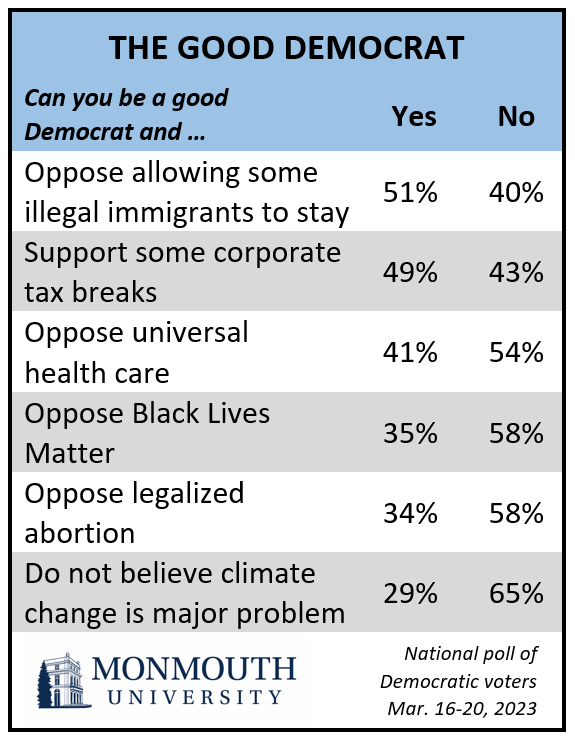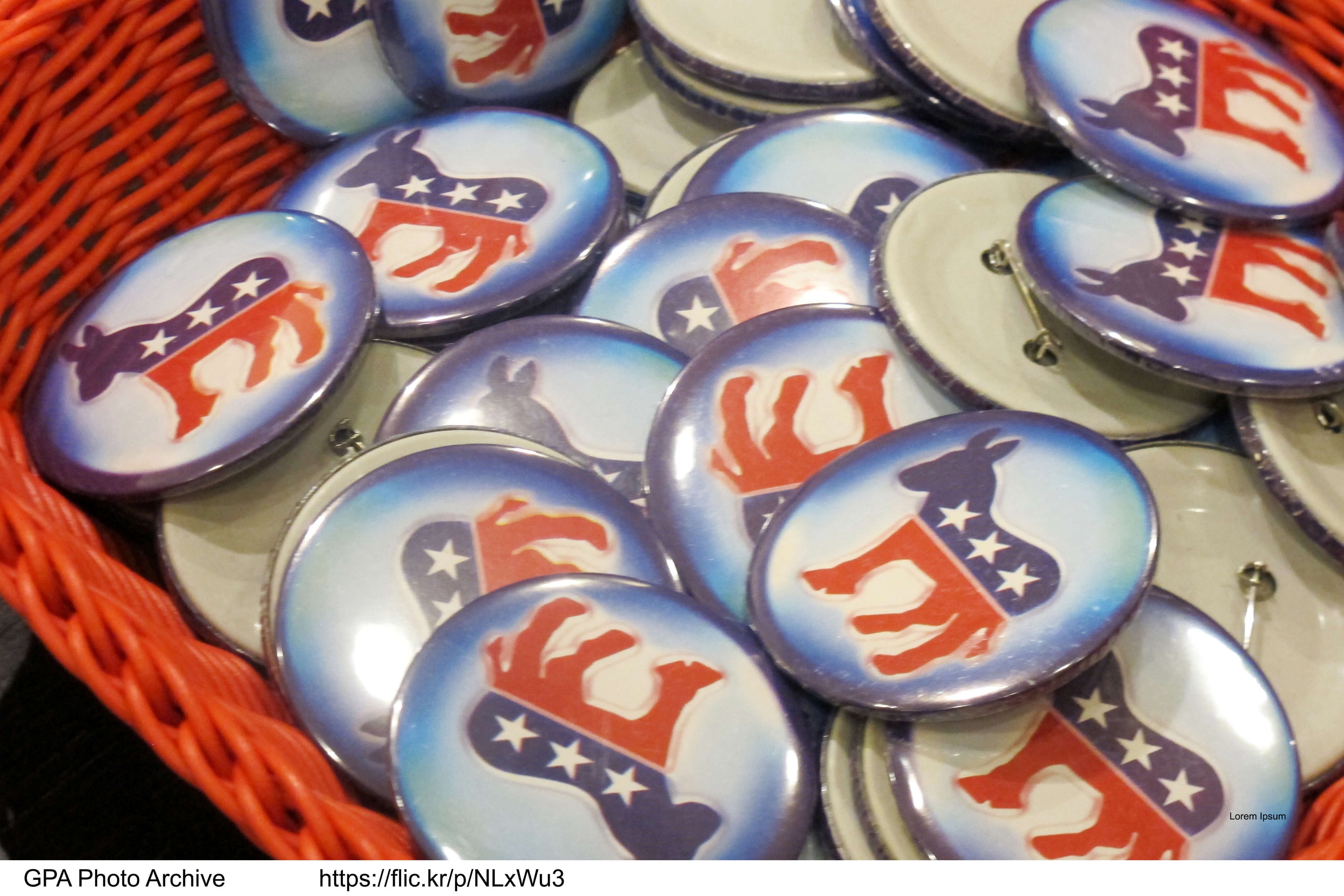West Long Branch, NJ – Looking out for others, providing a safety net for the vulnerable, and focusing on working-class issues are some of the ways Democratic voters describe what it means to be a good member of the party. The Monmouth (“Mon-muth”) University Poll of self-identified Democrats and Democratic-leaning voters also asked about specific issues that could define party loyalty. A majority of these voters point to climate change, abortion, and Black Lives Matter as issues with clear positions that a good Democrat should hold.
When asked to describe in their own words what it means to be a good Democrat, one-quarter of the party’s voters focus on social support. This includes a general sense that good Democrats “take care of others” (17%) and maintain a safety net for the disadvantaged (9%). Another 7% say being a good Democrat means focusing on working-class and middle-class issues. Specific policy areas mentioned include health care access (3%), abortion access (3%), environment and climate change (2%), while 3% say that good Democrats should generally have a liberal, progressive or socialist viewpoint. About 1 in 10 Democratic voters focus on “rights” as defining features of their partisan identity, including equal rights and human rights in general (6%), freedom and liberty (2%), anti-racism (2%) and LGBTQ+ rights (1%). Civic duty is also a common theme, including protecting democracy and the rule of law (6%), making sure to vote and participate in the process (6%), making informed choices (6%), and being willing to work across the aisle (5%). Another 7% say being a good Democrat simply means supporting their party over the Republicans. The current poll complements a survey of Republicans taken by Monmouth last year. In that poll, GOP voters focused on fiscal management, self-reliance, and patriotism and liberty as key hallmarks of what it means to be a good Republican.
“There isn’t a single prevailing view of what it means to be a good Democrat, but some themes emerge that bring to mind the proverbial big tent. Specifically, these voters say the party needs to look out for segments of society that may not get a fair break,” said Patrick Murray, director of the independent Monmouth University Polling Institute. He added, “Even when Democrats use the same terms as Republicans, such as liberty and freedom, their meaning is quite different.”
The poll also presented party voters with six policy areas and asked whether one needs to hold a specific position on each in order to be considered a good Democrat. The issue that shows the clearest delineation on defining party orthodoxy is climate change. Nearly 2 in 3 (65%) say someone who disagrees with climate change being a major problem cannot be considered a good Democrat. Just 29% say such a person can still be a good Democrat. Only 1 in 3 party voters feel someone who opposes legalized abortion (34%) or Black Lives Matter (35%) can be considered a good Democrat. Opposition to universal health care is also seen as an unacceptable position to most Democrats – just 41% say you can hold this view and still be considered a good party member.

Voters are divided over business taxes as a defining position. Specifically, 49% say voters who support some tax breaks for corporations can be a good Democrat while 43% say they cannot. Similarly, just over half (51%) of Democratic voters say opposition to allowing some illegal immigrants to stay in the country is an acceptable position for a good Democrat to have, while 40% say it is not.
In general, voters who describe their political views as very liberal – representing just over a quarter of the Democratic electorate – are more likely to see each of these issues as having a clear Democratic position. For example, just 30% of very liberal Democrats say you can oppose immigration reform and still be considered a good party member. By comparison, 50% of somewhat liberal Democrats and 62% of moderate to conservative Democrats say a good party member can hold such a position on immigration. Moderate and conservative Democrats – who comprise about half of party-affiliated voters – are more likely to feel that a good Democrat can be opposed to universal health care (48%), Black Lives Matter (45%) and legalized abortion (43%) than liberals as a whole. Climate change is the one area covered in the poll where clear majorities of very liberal (84%), somewhat liberal (61%), and moderate to conservative (57%) Democrats say that people who deny this is a major problem cannot be in good standing within the party.
There are few demographic differences on these policy-related descriptors of Democratic orthodoxy. Men (40%) are somewhat more likely than women (31%) to accept that someone who opposes abortion access can be considered a good Democrat, although that view is in the minority among both sexes. Democrats who are Black, Hispanic or Asian (61%) are much more likely than non-Hispanic white Democrats (42%) to say that opposition to amnesty for some illegal immigrants is acceptable within the party. Democrats without a college degree are somewhat more likely than college graduates to acknowledge fellow Democrats as good party members if they oppose immigration reform (55% non-college to 45% college) or Black Lives Matter (40% to 28%)
Compared to Monmouth’s survey of Republican voters conducted last year, Democrats are more likely to point to a number of issues as litmus tests on party identity. While the actual issues tested in the two party polls were worded differently, abortion was the only policy in the Republican poll where Republicans were more likely than not to have a definitive party position.
“Democrats seem to be more likely than Republicans to hold a common set of issue positions that defines, for them, what it means to be a member of the party in good standing,” said Murray.
The Monmouth University Poll was conducted by telephone and online from March 16 to 20, 2023 with 542 Democrat and Democrat leaning voters in the United States. The question results in this release have a margin of error of +/- 6.3 percentage points for the full sample. The poll was conducted by the Monmouth University Polling Institute in West Long Branch, NJ.
QUESTIONS AND RESULTS
(* Some columns may not add to 100% due to rounding.)
1.What does being a good Democrat mean to you? [LIST WAS NOT READ] [Note: Results add to more than 100% because multiple responses were accepted.]
| Response: | March 2023 |
|---|---|
| Always vote Dem, against GOP | 7% |
| Liberal, progressive, socialism | 3% |
| Vote, participate in process | 6% |
| Make informed choices, vote conscience | 6% |
| Honest, truthful | 3% |
| Fairness | 2% |
| Willing to compromise, work across aisle | 5% |
| Take care of others, look out for everyone | 17% |
| Working, middle class issues | 7% |
| Safety net for poor, disadvantaged | 9% |
| Healthcare access | 3% |
| Abortion access | 3% |
| Environment, climate change | 2% |
| Anti-racism, discrimination | 2% |
| LGBTQ+ | 1% |
| Equal rights, human rights | 6% |
| Freedom, liberty | 2% |
| Protect democracy, rule of law | 6% |
| Other | 18% |
| (VOL) Don’t know | 17% |
| (n) | (542) |
[QUESTIONS 2–7 WERE ROTATED]
2.Can someone who opposes legalized abortion be considered a good Democrat, or not?
| Response: | March 2023 |
|---|---|
| Can | 34% |
| Cannot | 58% |
| (VOL) Don’t know | 8% |
| (n) | (542) |
3.Can someone who opposes immigration reform that allows some illegal immigrants already here to stay in the country be considered a good Democrat, or not?
| Response: | March 2023 |
|---|---|
| Can | 51% |
| Cannot | 40% |
| (VOL) Don’t know | 9% |
| (n) | (542) |
4.Can someone who does not believe that climate change is a major problem be considered a good Democrat, or not?
| Response: | March 2023 |
|---|---|
| Can | 29% |
| Cannot | 65% |
| (VOL) Don’t know | 7% |
| (n) | (542) |
5.Can someone who supports some tax breaks for corporations be considered a good Democrat, or not?
| Response: | March 2023 |
|---|---|
| Can | 49% |
| Cannot | 43% |
| (VOL) Don’t know | 9% |
| (n) | (542) |
6.Can someone who opposes Black Lives Matters be considered a good Democrat, or not?
| Response: | March 2023 |
|---|---|
| Can | 35% |
| Cannot | 58% |
| (VOL) Don’t know | 7% |
| (n) | (542) |
7.Can someone who opposes universal health care be considered a good Democrat, or not?
| Response: | March 2023 |
|---|---|
| Can | 41% |
| Cannot | 54% |
| (VOL) Don’t know | 5% |
| (n) | (542) |
[Q8-11 previously released.]
Methodology
The Monmouth University Poll was sponsored and conducted by the Monmouth University Polling Institute from March 16 to 20, 2023 with a probability-based national random sample of 542 registered voters who identify with or lean toward the Democrat Party. Interviews were conducted in English, and included 151 live landline telephone interviews, 229 live cell phone interviews, and 162 online surveys via a cell phone text invitation. Telephone numbers were selected through a mix of random digit dialing and list-based sampling. Landline respondents were selected with a modified Troldahl-Carter youngest adult household screen. Interviewing services were provided by Braun Research, with sample obtained from Dynata (RDD, n= 189), Aristotle (list, n= 260) and a panel of prior Monmouth poll participants (n= 93). Monmouth is responsible for all aspects of the survey design, data weighting and analysis. The full sample is weighted for region, age, education, gender and race based on voter list and US Census information (ACS 2021 one-year survey). For results based on this sample, one can say with 95% confidence that the error attributable to sampling has a maximum margin of plus or minus 6.3 percentage points, adjusted for sample design effects (1.50). Sampling error can be larger for sub-groups (see table below). In addition to sampling error, one should bear in mind that question wording and practical difficulties in conducting surveys can introduce error or bias into the findings of opinion polls.
DEMOGRAPHICS (weighted) |
| Self-Reported |
| 52% Strong Democrat |
| 21% Democrat, not strong |
| 27% Independent, lean Dem. |
| 42% Male |
| 58% Female |
| 23% 18-34 |
| 23% 35-49 |
| 26% 50-64 |
| 28% 65+ |
| 55% White |
| 22% Black |
| 16% Hispanic |
| 7% Asian/Other |
| 30% High school or less |
| 31% Some college |
| 39% 4 year degree |
Click on pdf file link below for full methodology and crosstabs by key demographic groups.




